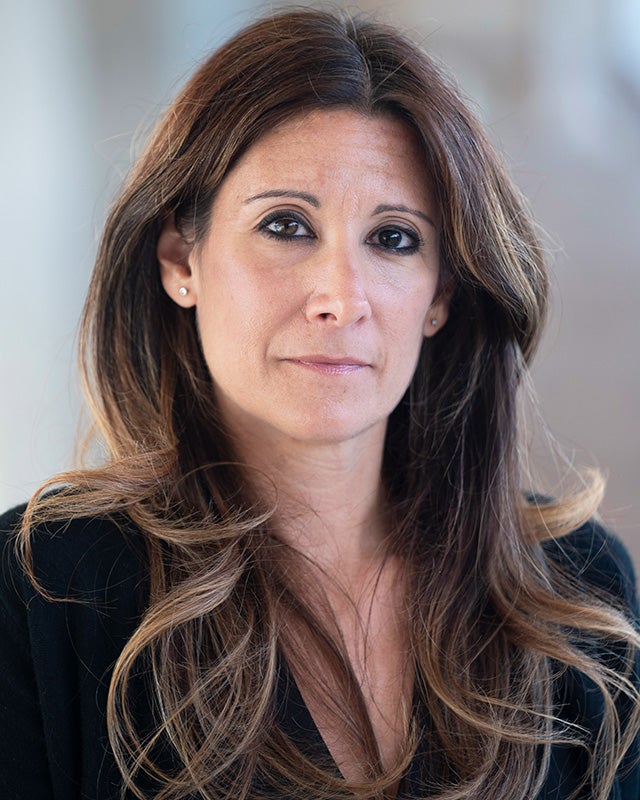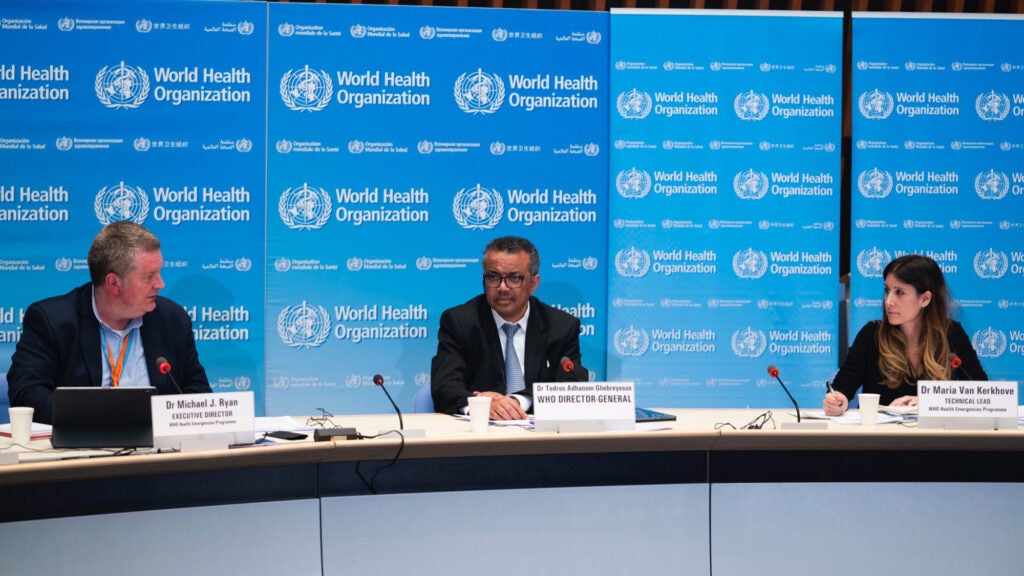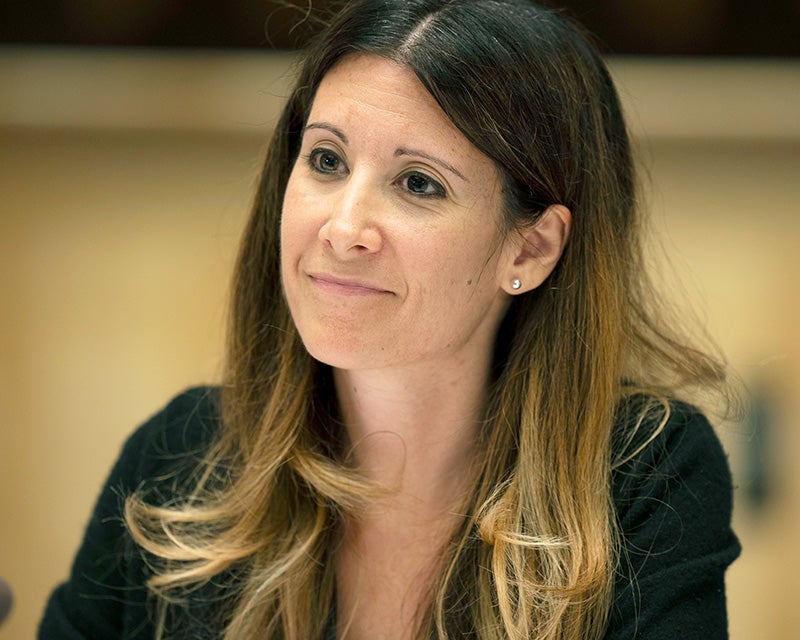Georgetown School of Health 2025 Commencement Speaker: Maria D. Van Kerkhove, PhD

Maria Van Kerkhove, PhD
(April 28, 2025) — Throughout her career in public health, Maria Van Kerkhove, PhD, has been guided by a belief that “not only do outbreaks begin and end in communities, they can also be prevented by communities with the right information, resources and support.”
However, it was her frontline role during the COVID-19 pandemic that truly drove home the significance of this premise — that scientific rigor does not exist in a vacuum, but rather must function as part of an ongoing dialogue with the communities most affected by public health threats.
As interim director of the department of epidemic and pandemic threat management at the World Health Organization (WHO), Van Kerkhove leads the development and implementation of prevention and control programs for pathogens with epidemic and pandemic potential — ranging from Ebola and Marburg viruses to highly contagious respiratory threats like influenza, MERS and COVID, to pathogens transmitted by mosquitoes and ticks.
During the COVID-19 pandemic, she was named health operations and technical lead, responsible for convening the world’s expertise, working with partners to advance science to address unknowns about the virus, developing evidence-based guidance, strategies and operational tools, and supporting countries to reduce the spread of the virus — and save lives and livelihoods.
On top of her main roles, she was also unexpectedly called upon to brief international media and the public, at one point daily press conferences, alongside Tedros Adhanom Ghebreyesus, director-general of WHO, and Michael J. Ryan, deputy director-general of WHO and executive director of the Health Emergencies Programme.
While she never sought the spotlight, after 250 press conferences and some 100 social media live Q&As, the experience impressed upon Van Kerkhove the inextricable connectedness of science, public health, communication and trust.
“I never set out to be the explainer. It was never part of my plan, and was certainly not in my terms of reference,” she said. Yet she didn’t hesitate, understanding the critical need.
“I knew that getting information out in a timely way could spare people unnecessary suffering and save lives. It was always about answering direct questions with direct answers: providing information on what we knew, what we didn’t know, what the collective global public health community were doing to find out, and what it meant for people to keep themselves and their loved ones safe.”
In recognition of her numerous contributions to investigating and demystifying public health, Georgetown University School of Health is pleased to welcome Van Kerkhove as its commencement speaker for the graduating class of 2025. She will receive the honorary degree of Doctor of Science.
A Budding Passion for Pathogens
While she had always liked science, Van Kerkhove’s passion for infectious diseases began in her high school AP biology class, when she learned about the 1995 Ebola outbreak in Kikwit, Democratic Republic of the Congo
“My interest was sparked about these pathogens that cause outbreaks. How and why do they affect some people and not others? How are they sometimes not lethal to animals, but can jump to humans and kill so many?” she said.
As an undergraduate at Cornell University, she conducted field research in ethnobotany, which studies the relationships between humans and the medicinal properties of plants, and zoopharmacognosy, the multidisciplinary study of how animals self-medicate using plants, soils and insects. This paved the way for her to work with indigenous communities in Latin America to study medicinal plants and traditional approaches to disease management.
“I fell in love with that form of investigation — just talking with people and really listening to the medicine men and women in the communities who knew every single plant and what it was used for medicinally.”
After earning her master’s degree in epidemiology from Stanford University, Van Kerkhove spent five years at an engineering and scientific consulting firm in New York, where she honed her skills in comprehensive evidence assessment and public communication — experiences that would prove invaluable during later public health crises.
She went on to pursue her PhD from the London School of Hygiene & Tropical Medicine and Institut Pasteur’s Department of Global Health. During this time, she conducted field research on H5N1 in Cambodia, where she learned about outbreak investigation, working across disciplines using a One Health approach, and the political aspect of outbreaks.

During the COVID-19 pandemic, Van Kerkhove (right) briefed international media and the public alongside Tedros Adhanom Ghebreyesus (center), director-general of WHO, and Michael J. Ryan (left), deputy director-general of WHO and executive director of the Health Emergencies Programme.
The Path to WHO
Van Kerkhove’s future path came more sharply into focus once she learned about the WHO. The organization’s global nature and multilateralism deeply appealed to her, particularly “the technical merged with the political and the diplomacy.”
“I was determined to find a way to work there,” she said.
Her dedication was such that she accepted a symbolic $1 contract with the WHO for eight years while maintaining her position at Imperial College London following her PhD. From 2015 to 2017, Van Kerkhove led the outbreak investigation task force at Institut Pasteur before finally joining the WHO full-time in 2017. Throughout this period, she participated in numerous outbreak investigation missions, primarily in the Middle East and Asia.
“This was an incredibly rewarding time, to be able to support countries in focusing on solutions during difficult times for governments and their people, to look for solutions rather than blame,” she said. “The WHO has its challenges, but its mission is absolutely essential to keep the world safe. If it didn’t exist, we would need to create it today. We often say that we are not just the World Health Organization, we are the world’s health organization.”
Commitment to Collaboration
Van Kerkhove’s journey from a curious high school student to a globally recognized public health leader demonstrates the power of following one’s scientific passions, even without a predetermined path.

Van Kerkhove believes that students entering into the field of health today are needed more than ever.
“You don’t have to have it all figured out,” Van Kerkhove said. Her own path was guided by curiosity and opportunity rather than a rigid plan.
What has remained constant is her commitment to collaboration and to inviting varied perspectives into the mix.
“I’ve had a lot of opportunities, and I’ve taken risks. But I recognize that I never do anything alone — it’s always been about collaboration for me, as I think other people’s questions, viewpoints, expertise and experience always add value,” she said.
This collaborative approach has become fundamental to her work addressing global health emergencies.
“Bringing more voices, more disciplines, and more cultural perspectives will improve whatever outcomes you are hoping to achieve,” she said. “So whether you’re talking about working with communities or preventing or controlling pandemics, cultivating and maintaining that type of collaboration is a valuable skill.”
A Guiding Vision for Public Health
Through her commitment to curiosity, collaboration and connecting scientific inquiry with community needs, Van Kerkhove exemplifies Georgetown University School of Health’s philosophy of recognizing the dignity and wholeness of each person, and Georgetown’s ethos of cura personalis, or care of the whole person.
She believes now is the time to double down on these values, and that students entering into the field of health today are needed more than ever.
“This is exactly the right time for students in the field of public health — in global health — to make their contributions,” she said. “Given the challenges we face today in public health, we need to think differently about how we do this work moving forward during these complex times. And it’s this generation that will figure that out.”
- Tagged
- Commencement 2025
